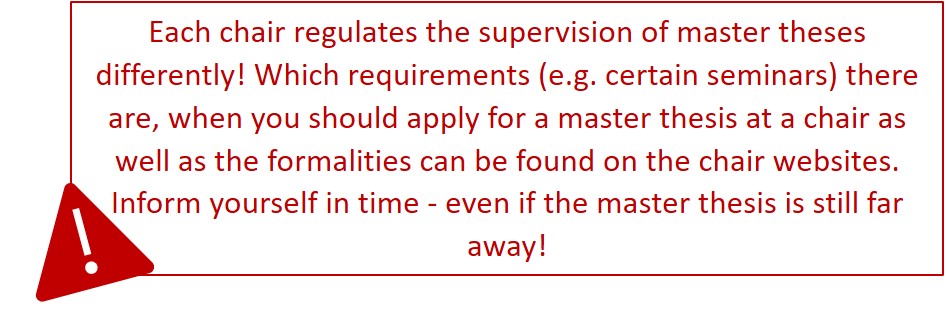The bachelor’s program including the bachelor’s thesis has already been completed and with it, presumably, the first obstacles in the preparation of scientific papers. In addition, the proportion of term papers and practice-oriented seminars in the master’s program is often significantly greater than in the bachelor’s program. But the master’s thesis also brings new challenges and pitfalls for many students.
In order to improve your preparation for these challenges, we would like to help you with this article on the way to your master’s thesis.
Help – Where do I write my master’s thesis?
- For their master studies many students change to another university, in this case to FAU or WiSo. A new university also means many new chairs, professors and lecturers. Of course, students get to know some of these professors and lecturers in courses, but especially in the Master’s program, which usually only has four semesters of standard study time, the so-called familiarization period is limited. This short ” familiarization period” can also be challenging for students who do not change universities for the master’s program. Finally, when looking for suitable supervisors, students often pay attention to the first impression of the supervisors in addition to a suitable choice of topics.
- WiSo offers students something that can be seen as both a curse and a blessing: With more than 50 chairs, students have a wide choice of chairs at whose department it is possible to write a master’s thesis. Of course, there are certain restrictions for the choice of a chair, e.g. thematically, depending on the course of study. Despite these restrictions, the choice remains broad.

Each chair regulates the supervision of master theses differently! Which requirements (e.g. certain seminars) exist, when you should apply for a master thesis at a chair as well as the formalities can be found on the chair websites. Inform yourself in time – even if the master thesis is still far away!
Tips:
- You are not the first master students of WiSo! The years before you have also written their master thesis at WiSo or are currently doing so. Therefore, don’t be afraid to ask about their experiences and to network – after all, everyone benefits from this. Use WhatsApp, Facebook or even teams groups or create such groups if there are none yet (your fellow students will thank you). The numerous student initiatives are also a great way to network with other students!
- There are numerous platforms (e.g. Studydrive) where you can find out about your experiences with chairs and supervisors.
- You can also always contact potential supervisors personally if you have any questions. This is also a good opportunity to get to know them better or to get a first impression.
“When looking for a suitable place for the master’s thesis, I first created an overview of which chairs would be thematically suitable for me and also oriented myself to the topics already advertised for theses. In addition, I found it helpful to take seminars with potential supervisors to get a better impression of them.”
Nina, Master’s student Labor Market & Human Resources
Help – What topic do I write my master’s thesis about?
- During their Master’s studies, students often come away with an idea of the direction they would like to take later in their careers and where their interests lie. Accordingly, there is often already a rough idea when choosing a topic. But here, too, the large selection of chairs can quickly lead to decision-making problems.
- Finding an interesting topic does not necessarily mean finding a suitable topic for the master’s thesis: Because the scope of a master’s thesis is also limited and therefore the topic and research question should be formulated as specifically as possible in order not to lose the thread in the master’s thesis later on.

In addition to the choice of topic, there is also the question of what type of master’s thesis you intend to write: Literature research or empirical master thesis? Maybe with practical relevance in a company or even abroad?
Tips:
- Many chairs as well as professors* post possible topics and subject areas for theses on their chair websites. Take a look at these to get a good feeling for which topics and questions are suitable for a master’s thesis – you might even find a fitting topic for your master’s thesis.
- In the course of your master studies you will certainly write one or another essay, have the master thesis in mind. Maybe you can tie in with these topics and questions.
- Make sure that you choose a topic that interests you! After all, you will be dealing with this topic over a period of 6 months and interest is the best motivation!
“My tip would be: it’s best to look back at your studies and go in search of seminars or research projects that you enjoyed and try to build on that. It makes it easier if you don’t start from scratch and are already familiar with the person supervising you or the subject area.”
Melanie, former master’s student in social economics
General hints and tips:
The master’s thesis certainly doesn’t write itself, but there’s no reason to dread it either. Start-up difficulties in finding the topic or a suitable chair, writer’s block or even panic about the approaching deadline: This is how many students feel!
Try to deal with the topic of your Master’s thesis in time and take enough time for it (not too much work or other exam stress on the side). If you make yourself a rough schedule with enough buffer, then even minor setbacks or a few unproductive days can not bring you out of your concept!
Especially in the current situation, where more time than ever is spent at the desk at home, many students struggle against a lack of motivation – especially when it comes to final papers. Student Leo is writing his master’s thesis in the political science program during the winter semester 20/21. He shares his experiences with other students and offers tips on how to overcome a lack of motivation. For Leo’s “battle against motivational lack,” click here.
If you’re still unsure about the topic of academic writing, check out the library’s training courses. Also, numerous websites like Scribbr or Mentorium provide helpful tips and overviews.

Not every student works the same way. Find the best approach and working method for you and don’t be put off if one or the other tip has no added value for you!
Good luck with your master thesis!

The bachelor’s program including the bachelor’s thesis has already been completed and with it, presumably, the first obstacles in the preparation of scientific papers. In addition, the proportion of term papers and practice-oriented seminars in the master’s program is often significantly greater than in the bachelor’s program. But the master’s thesis also brings new challenges and pitfalls for many students.
In order to improve your preparation for these challenges, we would like to help you with this article on the way to your master’s thesis.
Help – Where do I write my master’s thesis?
Each chair regulates the supervision of master theses differently! Which requirements (e.g. certain seminars) exist, when you should apply for a master thesis at a chair as well as the formalities can be found on the chair websites. Inform yourself in time – even if the master thesis is still far away!
Tips:
“When looking for a suitable place for the master’s thesis, I first created an overview of which chairs would be thematically suitable for me and also oriented myself to the topics already advertised for theses. In addition, I found it helpful to take seminars with potential supervisors to get a better impression of them.”
Nina, Master’s student Labor Market & Human Resources
Help – What topic do I write my master’s thesis about?
In addition to the choice of topic, there is also the question of what type of master’s thesis you intend to write: Literature research or empirical master thesis? Maybe with practical relevance in a company or even abroad?
Tips:
“My tip would be: it’s best to look back at your studies and go in search of seminars or research projects that you enjoyed and try to build on that. It makes it easier if you don’t start from scratch and are already familiar with the person supervising you or the subject area.”
Melanie, former master’s student in social economics
General hints and tips:
The master’s thesis certainly doesn’t write itself, but there’s no reason to dread it either. Start-up difficulties in finding the topic or a suitable chair, writer’s block or even panic about the approaching deadline: This is how many students feel!
Try to deal with the topic of your Master’s thesis in time and take enough time for it (not too much work or other exam stress on the side). If you make yourself a rough schedule with enough buffer, then even minor setbacks or a few unproductive days can not bring you out of your concept!
Especially in the current situation, where more time than ever is spent at the desk at home, many students struggle against a lack of motivation – especially when it comes to final papers. Student Leo is writing his master’s thesis in the political science program during the winter semester 20/21. He shares his experiences with other students and offers tips on how to overcome a lack of motivation. For Leo’s “battle against motivational lack,” click here.
If you’re still unsure about the topic of academic writing, check out the library’s training courses. Also, numerous websites like Scribbr or Mentorium provide helpful tips and overviews.

Not every student works the same way. Find the best approach and working method for you and don’t be put off if one or the other tip has no added value for you!
Good luck with your master thesis!